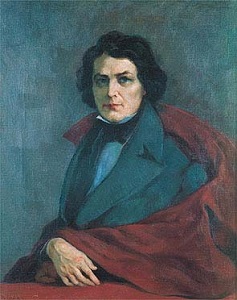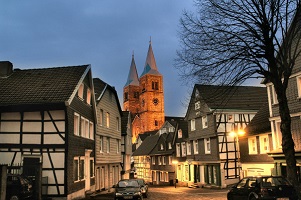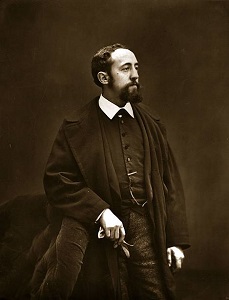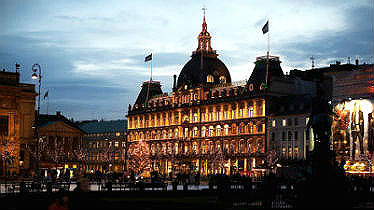De Sloveense dichter en schrijver France Prešeren werd geboren op 3 december 1800 in Vrba. Zie ook alle tags voor France Prešeren op dit blog en ook mijn blog van 3 december 2010.
A Wreath of Sonnets (5/14)
They come from where no man can sunshine find –
Not from those regions by your glance caressed,
Where all the cares of this world are at rest,
And sweet oblivion follows close behind;
Where joy reigns with a fullness scarce divined,
And vanished are the conflicts that distressed;
Where song springs from an overflowing breast
With sweetest harmonies of every kind;
Where nursed by pure love, grow the fairest flowers,
Luxuriant in beauty and in grace,
As though kissed by the breath of vernal hours.
My songs that praise you come from no such place;
They grew untouched by any friendly powers,
Unblest by soothing winds of warmer days.
A Wreath of Sonnets (6/14)
Unblest by soothing winds of warmer days,
My songs remain, since from you, haughty maid,
They never won the word that might be said –
The word that neither saddens nor dismays.
As you were bred upon the German phrase,
Like many a Slovene girl, they were afraid
That from such flowers on our Parnassus laid
With cold disdain you would avert your gaze.
Our Muses were not loved in our own land:
They were but spinsters doomed to lonely ways,
While foreign beauties won both heart and hand.
Like flowers that bud within the glacier’s maze,
Our songs are sparse, as though by nature banned,
Above them savage peaks the mountains raise.

France Prešeren (3 december 1800 – 8 februari 1849)
Portret door Bozidar Jakac, 1948
De Filipijnse schrijver F. Sionil José werd geboren op 3 december 1924 in Rosales, Pangasinan. Zie ook alle tags voor F. Sionil José op dit blog.
Uit: Tong
“By now, Meding was alarmed but Conrado assured her the house would not burn down as long as the switches were off. He dashed off to Bambang two blocks away to one of the electrical shops there.
He had passed the New Life Electrical Supply a few times but had rarely looked in; for once, he never bought electrical supplies in the neighborhood as he always bought them in the supermarket in Makati. It was then that he saw Alice Tan; she was in jeans and a katsa blouse with a high, lace collar and long sleeves that imparted to her an appearance at once regal and demure.
It was not a big shop. It carried hardware, nails, ropes, flashlights, but mostly electrical goods. She sat behind the glass counter and when he came in, she put down the weekly women’s magazine she was reading.
“I don’t think I would need an electrician,” he said. “It is just a burned line, I think. I put the switch off.”
“That is the first thing one should do,” she said with a professional tone. “I think you will need rubberized tape, and a pair of new fuses.”
“I am sure of that,” he said. “But how do I go about fixing it?” He was not sure now, having forgotten most of his physical classes in high school, the positive, the negative . . .
“Simple,” she said, bring out a roll of blue tape from the counter. “The lines should never get mixed up. When the covering is worn out and they cross each other, that’s when the trouble starts.”
“It is like a boy and a girl then,” he said with a laugh. “If they really get mixed up, there’s bound to be some result . . .”
She smiled at his little joke. “I hope you are not fooling me.” She said
“You can come to my house – its close by, in Makati,” he said. “It is dark.”
F. Sionil José (Rosales, 3 december 1924)
De Duitse dichter, folkzanger en jurist Franz Josef Degenhardt werd geboren op 3 december 1931 in Schwelm. Zie ook alle tags voor Franz Josef Degenhardt op dit blog en ook mijn blog van 3 december 2010.
Manchmal des Nachts
Manchmal des Nachts.
Wenn ich aus meiner Kneipe komm.
im Marschtritt durch die Strassen zieh
oder ich nicht schlafen kann,
trommelnd an meinem Fenster steh
Dann seh’ ich die, die Andern,
die vielleicht nicht anders sind.
Sie stehen rum,
wie Tiere vor den Augen der Besucher eines Sonntagzoos
und hören sie den Stiefeltritt der Ordnung, rennen sie gleich los.
Und schimpfen auf die Andern,
die vielleicht nicht anders sind.
Manchmal des Nachts,
dann steigen sie in Autos ein und fahr’n für eine Stunde weg.
Dann kommen sie zurück und spucken dreimal in den Dreck.
Und meinen die, die Andern,
die vielleicht nicht anders sind.
Manchmal des Nachts,
dann ziehen sie die Schuhe aus
und träumen an der Häuserwand
vom Ehemann, von Kindern,
vom Häuschen auf dem Land.
Vom Leben jener Andern,
die vielleicht nicht anders sind.
Manchmal des Nachts,
dann sprechen sie mich an
und eine kenn ich ganz genau.
Sie hat mit mir im Sand gespielt
and manchmal Mann und Frau.
Jetzt steht sie bei den Andern,
die vielleicht nicht anders sind.
Manchmal des Nachts,
wenn ich aus meiner Kneipe komm
im Marschschritt durch die Strassen zieh.
Oder ich nicht schlafen kann
trommelnd an meinem Fenster steh.
Dann seh’ ich die, die ändern,
die vielleicht nicht anders sind.

Franz Josef Degenhardt (3 december 1931 – 14 november 2011)
Schwelm
De Franse schrijver, criticus, theaterdirecteur en journalist Jules Claretie werd geboren op 3 december 1840 in Limoges. Zie ook alle tags voor Jules Claretie op dit blog en ook mijn blog van 3 december 2010.
Uit: Paris assiégé
“Heureux comme Dieu en France ! dit un proverbe allemand. C’est ce bonheur qu’ils enviaient et qu’ils ont détruit. Lorsque tombait sur nous quelqu’une de ces masses de fonte et de fer d’où jaillissait la mort, pendant le bombardement, un penseur s’arrêta devant un obus qui venait d’éclater et, avec un sourire amer, haussant les épaules, il dit :
« Philosophie allemande ! »
Maintenant tout est fini, la ville se ravitaille et digère sous le canon prussien. Les remparts sont désarmés, les uniformes disparaissent, les képis se cachent. Paris a déjà perdu sa mâle et altière physionomie. Ceux qui ne l’ont pas vu superbe et résistant auront perdu le spectacle le plus beau. Je sais qu’on l’a accusé de pusillanimité, et qui ? ceux-là mêmes qui l’ont fui avant l’investissement et qui, à Tours ou à Bordeaux, mangeaient des huîtres vertes tandis que nous mordions au pain gluant. Que Paris laisse dire ! Il a sauvé l’honneur du drapeau.
Qu’il songe à cette heure à ne plus redevenir la ville qu’il fut sous l’empire, le boudoir et le sérail, et à ne plus retourner, comme dit l’Écriture en son rude langage, à son vomissement. Après avoir été un camp où l’on veille, qu’il soit, comme jadis, une cité où l’on pense.
Debout, tous ses fils, écrivains, peintres, philosophes, artisans ! A l’œuvre, tous ! Au tableau, à l’atelier, au livre, au travail ! Il faut refaire la France. La France se meurt ! Il faut la sauver. Elle a jeté aux orties sa souquenille dorée. Tissons pour cette mère un manteau de pourpre qui la rende et plus fière et plus belle.
Rien n’est perdu si nous voulons être honnêtes et si nous savons rester libres. Des lois et des mœurs et nous reprenons, d’un bond, notre rang dans le monde.
Chère République, sois la vierge pure, la déesse austère, la Sabine et la Spartiate, non l’aventurière et l’affolée, sois la divinité de marbre et non la reine du carrefour, sois la vertu, sois le droit, sois le labeur incessant, sois le progrès, sois tout ce qui élève et tout ce qui sauve, sois celle qui combat la misère, qui force l’ignorance à rentrer aux ténèbres, sois la justicière qui défend la cause du travailleur et sauvegarde le salaire bien gagné, sois la liberté, sois l’égalité, sois l’amour, sois l’honneur, et notre France, notre chère France, notre pauvre France qui râle va renaître et va marcher encore à la tête des nations, son drapeau troué dans sa main.”

Jules Claretie (3 december 1840 – 23 december 1913)
De Noorse schrijver Ludvig Holberg werd geboren in Bergen op 3 december 1684. Zie ook alle tags voor Ludvig Holberg op dit blog en ook mijn blog van 3 december 2010.
Uit: Jeppe of the Hill (Vertaald door Oscar James Campbell, jr.)
“(Enter Jacob Shoemaker, in his shirt.)
JACOB. Who the dickens wants to get in so early?
JEPPE. Good morning to you, Jacob Shoemaker.
JACOB. Thank you, Jeppe! You are up and about bright and early to-day.
JEPPE. Let us have a pennyworth of brandy, Jacob!
JACOB. With all my heart, when you show me the penny.
JEPPE. I’ll give it to you when I come back here tomorrow.
JACOB. Jacob Shoemaker doesn’t give credit, I know you must have a penny or two about you to pay with.
JEPPE. Honestly, Jacob, I have nothing but what my wife gave me to spend in town for her.
JACOB. You can easily beat them down a few pence on what you buy. What is it you’re to get her?
JEPPE. I have to buy two pounds of soft soap.
JACOB. Why, can’t you tell her the soap cost a penny or two more than you give for it?
JEPPE. I’m so afraid my wife would find out about it, and then I’d be in trouble.
JACOB. Nonsense! How could she find out? Can’t you swear that you paid out all the money? You’re as stupid as an ox.
JEPPE. That’s true, Jacob! I can do that well enough.
JACOB. Out with your penny.
JEPPE. Here you are, but you must give me a penny change.
JACOB (coming in with the glass; drinks to him). Your health, Jeppe!
JEPPE. What a lot you take, you rogue!
JACOB. Oh, yes, but it’s the custom for the host to drink his guest’s health.”

Ludvig Holberg (3 december 1684 – 27 januari 1754)
Adventstijd in Kopenhagen
Zie voor bovenstaande schrijvers ook mijn blog van 3 december 2008 en ook mijn blog van 3 december 2007 en mijn blog van 3 december 2006.
